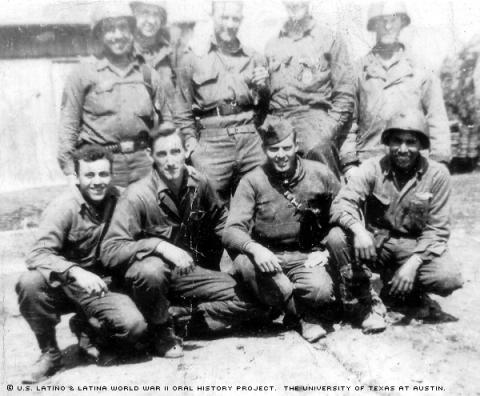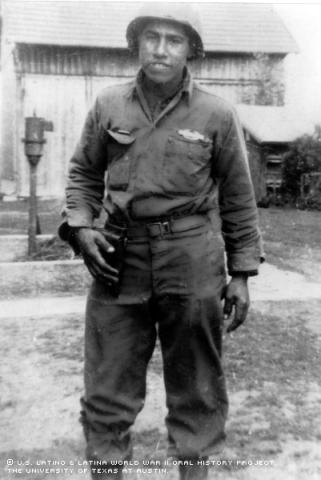


By Cynthia Agnew
Jesus "Jesse" Reyes, an accomplished shoe repairman, painter and World War II veteran, describes his Army experience as a life-altering phenomenon that helped him become the man he is today. The will to fight for his life when on the front line in Germany taught him that all good things come from hard work and perseverance.
Reyes was born Jan. 11, 1923, in Houston, Texas, the second of five children to Anastacio Reyes, a self-educated man from San Luis, Mexico, and Maria Gonzales Reyes, a housewife from Michoacan, Mexico. His father moved to Texas to work for the Southern Pacific Railroads; his mother and her family came to the state to escape persecution of Catholics. It was at church that Anastacio Reyes and Maria Gonzales met, and later married.
At an early age, Jesse Reyes realized the importance of family, and for that reason he often helped out with his younger siblings. He said he thinks the closeness and love of his family helped put him on the path to success. He describes his parents as the guiding light that helped him learn right from wrong when he was a child.
As a youth, Reyes enjoyed playing football, baseball and basketball. He remembers the homemade baseballs he would make to play with.
"We would take old socks, stuff them with newspaper, sew them up to use as baseballs," Reyes said. "Our bats were two-by-four pieces of wood."
During the Depression, the Reyes family was evicted from their home because they couldn't pay the rent. The family packed up their truck with their belongings and drove off. At a nearby store, the elder Reyes gave young Jesse 75 cents to go inside and buy as much food as he could get. Young Jesse also asked the butcher if he knew of a place to rent. The man looked out the window and saw the Reyes family piled into the truck, with their furniture and clothes, and told young Jesse that there was an abandoned house around the corner that they could move into. The house's owner had been killed by his dog, and now the house would be taken by the state. The Reyes family lived there for 10 rent-free years before the bureaucracy caught on.
In his youth, Reyes would escape to the baseball field to have fun. It was also where he received the news of the attack on Pearl Harbor. His oldest sister, Isabel, ran out to tell him about the attack, and he went home to listen to the family's radio. It would be the first time that he considered joining the military and fighting for his country.
"I still remember hearing President Roosevelt declare war on Japan. It was so moving that I rushed down to sign up for the military,'' Reyes said. "The only problem was that my mother would not sign the paperwork, and I had wait to be drafted."
That came soon enough: a year later, Reyes notified that he would be drafted. He was inducted on Jan. 19, 1943.
Reyes was sent to Fort Sam Houston, near San Antonio, to receive basic training. It was the first time he had ever left Houston. He first served in the Army Air Force in a Quartermaster's unit, assigned to shoe repair, but Reyes wanted to go and fight in the war.
"I wanted to be a pilot at first but was not able to because I did not have a college education,'' he said. "But I still wanted to go to war and do my part."
In 1944, he applied for a B-17 gunner position.
"There was a call for gunners, and I tried for a chance to go to gunnery school," he said. "However, since everything in the Army Air Force was done alphabetically, and since my last name was Reyes ... by the time they would get up to the R's, they had their quota."
Later, a call was sent out for volunteers to join Army infantry units for a possible tour of duty.
"They did not send me - I volunteered for it. I asked for a transfer. I'm glad I did," Reyes said. "I saw my share of action. On the first day of action I was lucky to be involved in the capture of four German soldiers."
Reyes joined C Company, 8th Infantry Regiment, 4th Infantry Division in January 1945.
"The Battle of the Bulge had scattered the units," Reyes said. "We found my [company] in France about the tenth of January, 1945."
After arriving, it was his and the other soldiers' responsibility to find the rest of the troops.
"We were tied together by a rope as we climbed up the hills so that no one would be lost," he said. "We were told to stay about 10 to 15 feet apart so that we could protect ourselves and each other."
Reyes said that when he arrived in Europe, he saw acres of tanks and dead German soldiers everywhere.
"This was mop-up time," he said. "The other troops were there to clean up, and we were sent on another mission."
Reyes' unit was sent to Germany, where the men captured small cities and liberated concentration camps. He said he couldn't recall the names of the camps, but that they were outside Munich.
"We broke down the fence and saw the people running - no, they could not run, they were walking," he said. "They were walking corpses trying to get through the snow."
The soldiers were transported on tanks through the German countryside. Reyes recalled an incident while traveling to Frankfurt in March 1945.
"I rode on tank two of the three that had been sent, and this is when I saw my most horrible sight," he said. "We were coming over a hill when the commander of the first tank was shot. We immediately halted and retreated. When I looked down at my jacket, it was like someone had thrown a handful of hamburger meat at me. I was covered with his blood."
After all that he had seen, Reyes said, he prayed. He asked God to allow him to return home alive so he could find a good woman and have a family.
In 1945, Reyes was discharged, earning three Campaign Stars (Ardennes, Central Europe and the Rhineland) and a Presidential Unit Citation.
He returned to the United States, back to his hometown of Houston, where he tried to resume a normal life. Reyes returned to shoe repair, which later opened the door to his current job now as an orthopedic technician with Shriner Hospital Medical Center.
Reyes married Frances Rodriguez on July 30, 1949, and they have two sons, Jesse "Junior" and Edward.
Reyes said he thanks God and his parents for instilling in him the will to succeed. He says that without a belief in God or himself, he would be like a boat in the water without a paddle.

